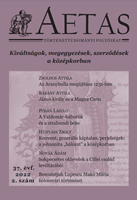Az Aranybulla megújítása 1231-ben
The Renewal of the Golden Bull in 1231
Author(s): Attila ZsoldosSubject(s): Cultural history, Social history, 13th to 14th Centuries, Politics of History/Memory
Published by: AETAS Könyv- és Lapkiadó Egyesület
Keywords: Golden Bull; 1231; King Andrew II of Hungary;
Summary/Abstract: This study examines the history of the creation of the 1231 renewed version of the Golden Bull originally created by King Andrew II of Hungary (1205-1235) in 1222, as well as the contents of the decree. First, the political conflicts that eventually forced the renewal are discussed briefly. These included the annulment of the marriage between the heir to the throne, Prince Béla and Maria Laskarida; the 1225 expulsion of the Teutonic Order, who settled in the Kingdom of Hungary in 1211; the debates regarding the status of the muslims and jews living in the country; and the revision of the earlier royal land grants between 1228 and 1231. The author believes that the renewed Golden Bull was most likely published at a nationwide legislative assembly close to the 20th of August, the day of St. Stephen, probably at Fehérvár. The primary considerations in the reworking of the Golden Bull are easily identifiable. One of these was the willingness to conform to the interests and viewpoints of the Church. However, another clear goal of some of the changes in the text was expanding the options of Andrew II. The whole decree bears the unmistakable mark of royal power, just like the 1222 original. Therefore, the renewed Golden Bull is also not a collection of the demands of those opposed to the king, instead it contains what the king was willing to concede to quell the political turmoil surrounding him.
Journal: AETAS - Történettudományi folyóirat
- Issue Year: 2022
- Issue No: 2
- Page Range: 5-20
- Page Count: 16
- Language: Hungarian

